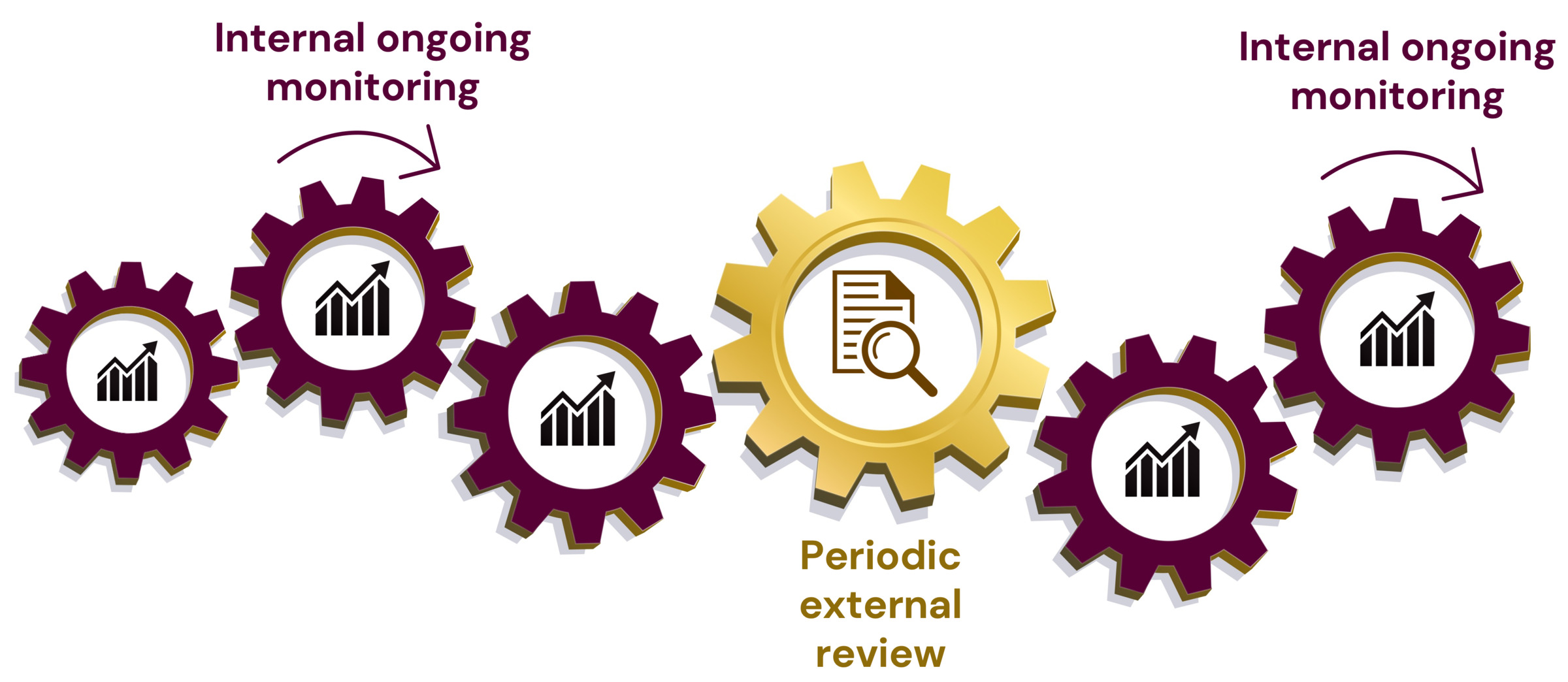Quality assurance of first- and second-circle programmes
Karolinska Institutet (KI) has a quality assurance system (QA-system) to provide systematic quality assurance in research and in all levels of education.
Quality assurance system at KI:
- is based on the Swedish Higher Education Act and Ordinance
- follows the Standards and Guidelines for Quality Assurance in the European Higher Education Sector (ESG)
- embraces the goals described in KI’s Strategy 2030
Main processes
KI's QA-system includes two main processes (see illustration below):
- Internal ongoing monitoring
- Periodic external review

Ongoing monitoring
Quality assurance through ongoing monitoring involves follow ups of how students, former students (alumni), teachers and employers perceive the quality of the education:
- A course evaluation is always made among all students after a course is finished and teachers performs a course analysis.
- A questionnaire survey is made in the beginning, during and after a programme among beginners, recent graduates, alumni and their employers.
- A questionnaire survey is made every four years to follow up the student social learning environment.
- A questionnaire survey is made by KI-region Stockholm among students, supervisors and management in work placement and clinical training.
The results of the ongoing monitoring are used in the improvement work
The results of ongoing monitoring are compiled and published on KI's website and they form the basis for the programmes' quality development plans. The information is used, among other things, to follow up and identify the need for improvement work.
Reporting from the departments on their education assignments
KI’s departments report on their education assignments to the Committee of higher education once a year. The report covers several areas deemed relevant by the Committee.
An important consideration is that the content of the report covers all relevant quality aspects so that the Committee doesn’t need to ask for several different reports during the year.
The Committee for higher education assigns the departments to report back on their education assignments for the coming year, one year in advance. By doing this the departments can integrate activities in their work plan a year before they are asked to report the work to the Committee.
In February the departments send their report on the previous year to the Committee. The Committee analyses and summarises the reports from the departments in a committee report. The committee report reports the Committee's analysis of the quality of the education, improvement work carried out during the year and identified needs for improvement work in the short and long term. The Committee presents its report to the Faculty Board in May each year.
The Committee also collects the quality development plan from departments and programmes and arrange peer review sessions where colleagues from other departments exchange feedback and advice regarding the quality development plans.
The process of reporting on the education assignments is an important part of the quality assurance process at Department level, Committee level and central university level including the Faculty Board.
Periodic review
All first- and second-cycle programmes at KI will undergo a peer review every eight years with external reviewers. The programmes are divided into eight groups and one group per year will be reviewed between 2022 and 2027.
The periodic review is a cooperation between the programme management, teachers and students in the programme and an external assessment panel with independent and impartial peers, employer and working life representatives.
A periodic review of a programme starts with a self-evaluation performed by the programme management together with teacher- and student representatives. The self-evaluation describes and reflects upon strengths and weaknesses within each of the criterions included in the review. Then the assessment panel assess the programme based on the self-evaluation and interviews with the programme management, teacher- and student representatives. The assessment then results in feedback to the programme management about weaknesses and strengths as well as recommendations about development areas and activities.
The results from a periodic review are used in the development of the programme
The programme management develops an action plan based on the identified areas of development. The action plan is followed up by the Committee of higher education and integrated in the programme quality development plan that is included in the annual ongoing monitoring process described above.
